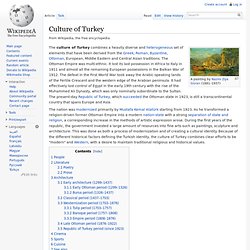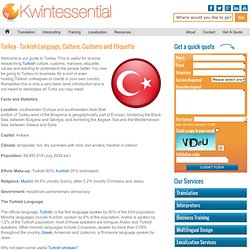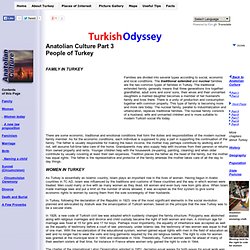

Culture of Turkey. The culture of Turkey combines a heavily diverse and heterogeneous set of elements that have been derived from the Greek, Roman, Byzantine, Ottoman, European, Middle Eastern and Central Asian traditions.

The Ottoman Empire was multi-ethnic. It lost its last possession in Africa to Italy in 1911 and almost all the remaining European possessions in the Balkan War of 1912. The defeat in the First World War took away the Arabic-speaking lands of the Fertile Crescent and the western edge of the Arabian peninsula. It had effectively lost control of Egypt in the early 19th century with the rise of the Muhammed Ali Dynasty, which was only nominally subordinate to the Sultan. The present-day Republic of Turkey, which succeeded the Ottoman state in 1923, is still a transcontinental country that spans Europe and Asia. The nation was modernized primarily by Mustafa Kemal Atatürk starting from 1923. People[edit] Turkish culture has undergone profound changes over the last century. Literature[edit] Turkey - Turkish Language.
Welcome to our guide to Turkey.

This is useful for anyone researching Turkish culture, customs, manners, etiquette, values and wanting to understand the people better. You may be going to Turkey on business, for a visit or even hosting Turkish colleagues or clients in your own country. Remember this is only a very basic level introduction and is not meant to stereotype all Turks you may meet! Facts and Statistics Location: southeastern Europe and southwestern Asia (that portion of Turkey west of the Bosporus is geographically part of Europe), bordering the Black Sea, between Bulgaria and Georgia, and bordering the Aegean Sea and the Mediterranean Sea, between Greece and Syria Capital: Ankara Climate: temperate; hot, dry summers with mild, wet winters; harsher in interior Population: 68,893,918 (July 2004 est.)
Ethnic Make-up: Turkish 80%, Kurdish 20% (estimated) Religions: Muslim 99.8% (mostly Sunni), other 0.2% (mostly Christians and Jews) Government: republican parliamentary democracy. Turkish Culture Portal. Culture of Turkey. There are some economic, traditional and emotional conditions that form the duties and responsibilities of the modern nuclear family member.

As for the economic conditions, each individual is supposed to play a part in supporting the continuation of the family. The father is usually responsible for making the basic income, the mother may perhaps contribute by working and if not, will assume full-time take care of the home. Grandparents may also supply help with incomes from their pension or returns from owned property and rents. Younger children help with the housework (re-pairing, painting, cleaning) and when older contribute by usually covering at least their own expenses. Tradition places the father as the head of the family, but the mother has equal rights.
As Turkey is essentially an Islamic country, Islam plays an important role in the lives of women. In 1926, a new code of Turkish civil law was adopted which suddenly changed the family structure. Women today. German-Jewish Culture in Turkey. Turkey: Protest culture flowers at Istanbul's Taksim Square.